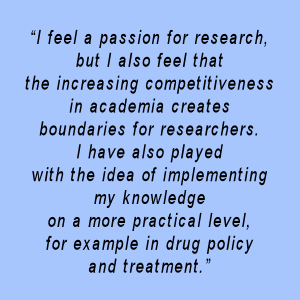What’s so fascinating about addiction realities? Petteri Koivula’s doctoral dissertation work enquires into how addiction is performed as an illness of the brain in scientific and media practices. He explains why this can have meaningful implications for people with addiction.
 With rapid advances in neurotechnology, such as neuroimaging, the brain has become the most prominent site for exploring addictive behaviours. Meanwhile, people’s capability to stay healthy and well-functioning is increasingly seen to be intimately connected to their capability to exercise personal agency. While finishing his master’s studies, Koivula got interested in this strange contradiction. How does the view of addiction as a brain disease affect addiction policies and treatment, and influence how people with addiction are viewed? A possibility to study this matter came about in 2018 within the CEACG project for the ethical implementation of addiction neuroscience (the A-BRAIN).
With rapid advances in neurotechnology, such as neuroimaging, the brain has become the most prominent site for exploring addictive behaviours. Meanwhile, people’s capability to stay healthy and well-functioning is increasingly seen to be intimately connected to their capability to exercise personal agency. While finishing his master’s studies, Koivula got interested in this strange contradiction. How does the view of addiction as a brain disease affect addiction policies and treatment, and influence how people with addiction are viewed? A possibility to study this matter came about in 2018 within the CEACG project for the ethical implementation of addiction neuroscience (the A-BRAIN).
Agency and addiction
It has been claimed that the strong framing of addiction as a brain disease might be harmful for the perception of individual capabilities and agency in people coping with addiction.
““Addiction’ is not really just a single phenomenon or reality, but it is complex and fluid, and always done and re-done in specific time, place and circumstances. There are political, material and social factors that always weigh in, and even though it is not possible to trace them all, we should try to treat and research addiction in a more holistic way to understand the implications for agency of the persons concerned.”
As an example of how the current paradigm affects treatment, Koivula mentions the role of medication:
“For instance in Finland, people who receive substitution therapy for their drug use receive very little other support for their life situation than the replacement drug itself. What are the specific socio-material relations that form this current situation where people who really need all the possible social support the most, are only given a medicine? We know that is only one part of the ‘solution’ to their life circumstances.”

Koivula sees that the reductionist claim of addiction only being a chronic, relapsing disease of the brain, can have restrictive consequences for the sense of agency in people with addictive behaviours and dependencies.
Different perspectives
Koivula’s research focuses on three aspects on addiction through the analysis of three different data corpuses: media data regarding the opioid crisis in North America, scientific accounts such as neuroscientific articles about addiction and brain, and group interviews of clients in out-patient addiction treatment at Toronto-based Center for Addictions and Mental Health CAMH.
What, then, is your own view: How should we deal with addiction in order to promote agency among people with addiction?
“If we really want to understand how we perform addiction and agency in society and how to deal with problems related to these constructs, we should avoid constructing too reductionist realities of addiction. In my view, there are too narrow performances of addiction in both ‘natural’ and ‘social’ sciences. We should always try to take into account both material and social worlds when researching such complex phenomena.”
Koivula digs deeper into the dualisms surrounding the phenomenon drawing on new-materialism and interactive constructs of reality:
“We should forgo altogether dualistic notions of separate realities of material and social, and treat the world as multiple material-semantic realities, where things can always be otherwise.”
can always be otherwise.”
Koivula’s earlier works:
